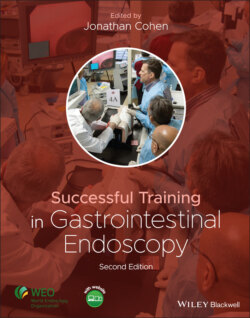Читать книгу Successful Training in Gastrointestinal Endoscopy - Группа авторов - Страница 46
Preprocedure
ОглавлениеThe preprocedure period encompasses all contact between the care provider(s) and the patient before administration of sedation and commencement of endoscopy. Important quality measures include proper indication for the procedure, informed consent, a focused history and physical exam, appropriate use of prophylactic antibiotics, a management plan for anticoagulants, the sedation plan, and a team pause (Table 3.1).
Studies have shown that when endoscopic procedures are performed for established indications, the yield of these procedures is highest [2]. An important quality measure in the preprocedure period is limiting the number of inappropriate procedures [2, 3]. When a procedure is performed outside of standard indications, care should be taken to document the justification for the procedure. Patients with marginal indications, particularly with higher risk procedures such as ERCP, are more likely to incur complications. Importantly, patients referred through open‐access endoscopy programs know little more than an abnormality was found on imaging or lab work. In this setting, it is imperative to define a patient–doctor relationship that empowers and educates the patient to understand the indication for the procedure and reviews the necessary elements of informed consent. Finally, a focused history and physical exam provides the physician important preoperative risk assessment and reassures the patient that the physician has properly considered their individual health prior to the procedure.
